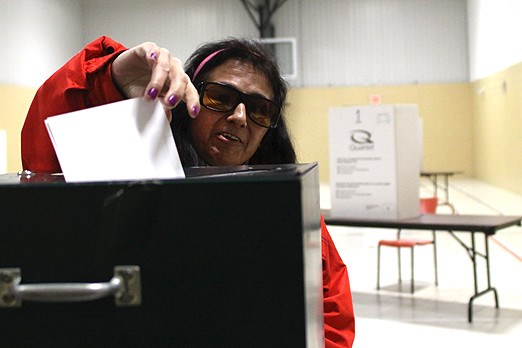With a vast majority accepting the $22 million offer, Fort William First Nation members say settling the Neebing specific claim has moved the band a step closer to being a real community.
Members of Fort William First Nation took to the polls Saturday and voted 942 in favour of the ratification of the Neebing specific claim. Five votes cast were against the offer. The federal government proposed a settlement of about $22 million in financial compensation and didn't include a land component.
The claim refers to the surrender of 6,400 acres of land in 1859 located west of the FWFN community. The First Nations submitted its claim in 2000 and went to the negotiation table in 2007.
Sandra Johnston, 58, said she is glad to have the matter settled and have the community move forward.
"We’re becoming a real community," Johnston said. "It’s very important that this settlement is done and that everything can be settled and everyone can be happy. I think it’s a good deal for everyone.
"It’s important to get this settle so we know where we are going as a community."
Evelyn Pelletier, 49, shared those same sentiments and said before the vote concluded that it was important that all FWFN members come out to vote to resolve the outstanding issue. Some members felt the compensation was too low but further negotiations with the government would just take too long, she said.
"I don’t think we’re ready for that long of a fight anymore," Pelletier said. "We’re tired of fighting. We’re tired of fighting for what we rightfully thought was ours. The compensation wasn’t what we hoped for, however I do think we’ll end up with a yes vote because people are tired of fighting."
Ian Bannon, manager of lands and claims negotiations for FWFN, said the turnout was one of the highest in the community’s’ history for a ratification vote. About 600 of the 1,435 eligible voters mailed in their ballots before the polling stations opened on Saturday, he said.
The Government of Canada at the time should have returned the land to FWFN members when settlers at the time weren’t interested in purchasing the land, he said.
"These claims have a lot of historical meaning to the communities," Bannon said. "These claims are involving historical activities that been done well into the 1800s where Canada and their representatives were trusted by the communities to look after property and property on their behalf. In certain cases, these obligations were breached. Therefore, First Nations have to go back with specific governments to resolve those matters."
Once accepted, FWFN members will receive a portion of the $22 million settlement on an individual basis, he said. Negotiation started in 2007, he said since most of the community members felt positive about the deal.
He added the settlement agreement marks a stepping stone before the next ratification of the $148 boundary claim with the vote scheduled on Jan. 22.
Sign in or register
- Messages
- Post a Listing
- Your Listings
- Your Profile
- Your Subscriptions
- Your Likes
- Your Business
- Support Local News
- Payment History
Registered Users
Already have an account?
New Users
Create a free account.
